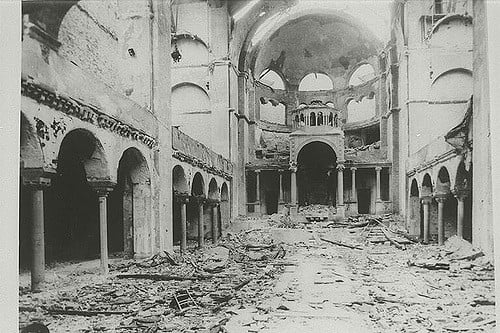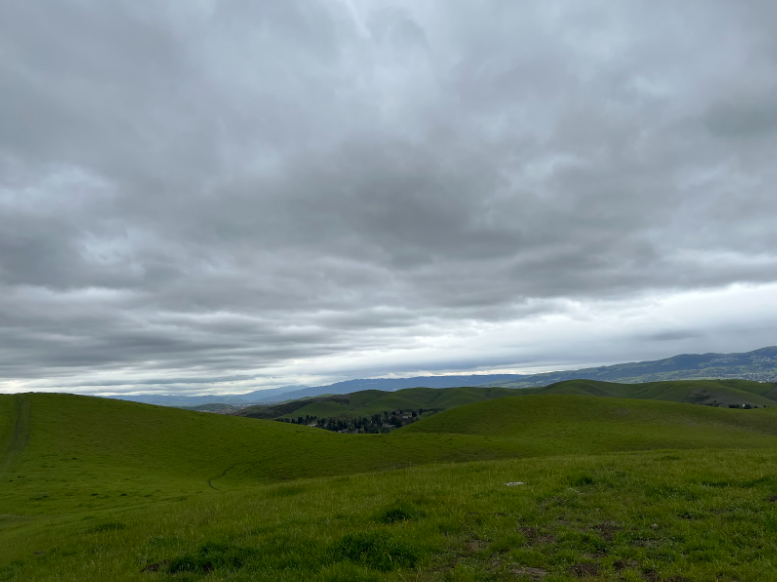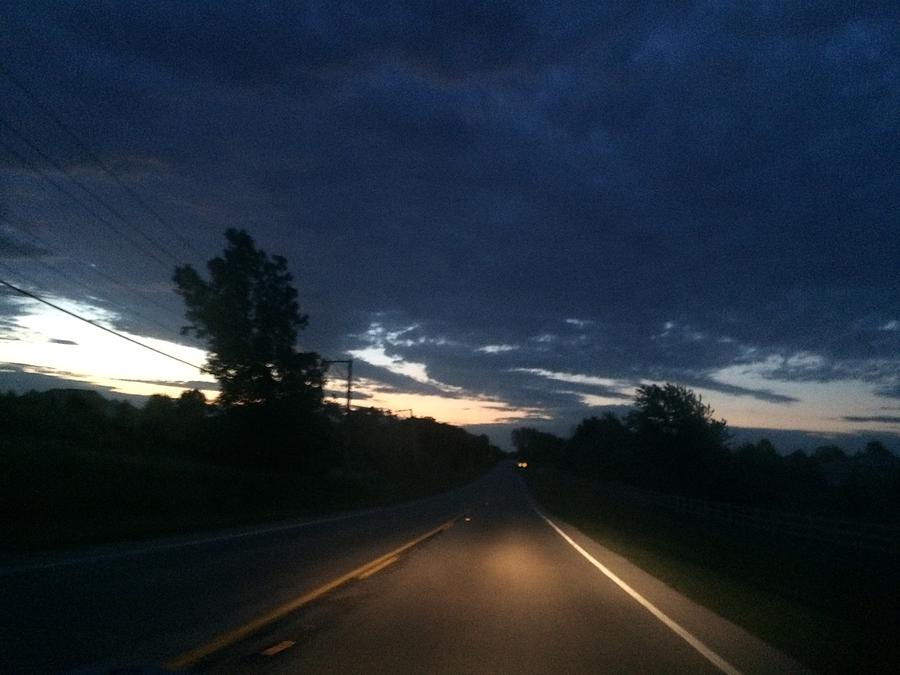10 Years after Breakage
When glass breaks, the world can still be seen. Glass is but a mirror, a vessel for the earth to reveal its secrets to humanity’s ignorant eyes. It does not seek to evoke desire, or attention, as is the way of its golden cousin, rather, glass seeks to give individuals the opportunity to observe all the contents of their world, transcending the bounds of illusive concrete walls and metallic structures. It’s thin, translucent frame, the fragility of its being, is why glass provides the greatest clarity. In the case that it should shatter for one reason or another, the world it reflects can still be seen, for glass, whether broken or intact, only hopes for the world to be discovered and understood.
I saw glass break frequently as a child. More than once, the brave vases that housed the lilac flowers on the kitchen counter had unpleasant meetings with my brothers’ wandering baseball. Sometimes, grandfather, zayde as we called him, would forget the location of his eyeglasses, and we’d find remnants of their transparent interior scattered under shelves or his bed frame. Yet the breakages never harmed anything other than the glass itself. The lilac flowers, though they were scattered on the floor, were just as beautiful as they were in a vase. The shattered eyeglasses, while impractical, still retained their frame and the potential to bring improved vision. In those moments, it would’ve been impossible for me to imagine a world where glass marked the beginning of my family’s peril, and yet, when cool air and charcoal armbands submerged my 14th November, it was glass that changed my life forever.
1 Year before Breakage
My father, abba, worked as a Professor of Literature at the University. Every Saturday evening, after the conclusion of Shabbat, he invited select students to our apartment for dinner, engaging them in discussions regarding a controversial work, or a rising, culturally significant author.
I frequently pleaded with abba to let me participate in these intellectual discourses, for I was convinced that I read more regularly and voraciously than any of his students. When abba was in the midst of writing his own book, I sat beside him every day, reading his carefully curated words over his shoulder. As I grew older, I conquered every book that abba kept in his study, reading them all cover to cover.
“An understanding of literature is not characterized by the rate of its consumption, but the ability to find the origin of the words you read. You are much too young to understand where stories are born. One must live many of their own stories before they can interpret those of others,” abba would tell, before stubbornly refusing my requests.
When the Spring of 1938 arrived, and snow was traded for emerald buds and the return of aerial creatures, I became a Bat Mitzvah. It was then, when I was tasked with reading and analyzing the stories of my people, that I was able to convince abba to allow me to participate in his scholarly conversations.
In the beginning, I mostly just listened, too timid to voice my opinions in front of confident 20-year-olds, who formally studied the art of studying. Soon, however, I found myself in heated debates regarding the implications of Marxism, or the context to Tolstoy’s dark perception of the human experience. I relished the shocked expressions that painted the faces of abba’s students, which appeared without fail with every word I spoke. I didn’t realize until much later, how uncommon my knowledge was for my age. I only wanted to endlessly read, as I had done every day alongside abba in my earliest years. At the time, the unconscious transfer of knowledge from books to my mind was only a happy byproduct of my desire to model my fathers’ behavior.
As spring seceded its reign to summer, I began to notice that the weekly literary gatherings were growing further apart, and by the time fall had set in, they had stopped altogether. When I asked abba why this was the case, he dismissed my questions with utterances of university policy before hastily changing the subject. Then one Shabbat evening, abba came home to announce that he no longer was working at the University, and that he had been dismissed, along with the remainder of his Jewish colleagues.
One week later, the Nazi’s raided our apartment, taking our Mezuzah, our golden candlesticks, and every book in abba’s study, including the one he had written himself. We didn’t know yet that the books’ fate would be sealed in flames, in the book burnings that would eventually take place outside the University where abba once worked. But what we would come to know much sooner than that was the sound of broken glass, and the resulting sight of an even more broken world.
The Breakage
In the year that followed abba’s firing, Hitler’s influence grew to dominate every facet of my life. The crooked, dark figure that once seemed few and far between had now overtaken the arms of my teachers and closest friends. David’s star, which had always represented resilience and connection to faith, was now reduced to an undesirable symbol sewn onto the clothes of an undesirable people. By the arrival of November 1939, abba was looking into relocating our family to England, but his immigration inquiries quickly died at closed borders and turned backs.
When the Breakage began, I was already asleep, for only half the night remained. It was my brother, Franz, who awakened me with his screams. To this day, his cries remain enshrined in my mind, for those wails would become my last memories of his voice.
As soon as I awoke, I ran into the living room to find Franz, abba, and zayde being carried away by Nazi’s. My mother, Ima clung to me while we stood in the Swastika’s shadow, weeping hysterically. Yet this breakage, the breakage of my family, was only the first of the night.
The second breakage was facilitated by gasoline, whose pungent smell coated the circumference of my neighborhood. The synagogue where my family spent our Sundays, the bakery ima visited on Shabbat mornings, and the library that consumed my afternoons were all reduced to smoke and tar. This was the breakage of my home, and the only life I knew.
However, the largest breakage of that November night was found in the shards of glass that lined the streets. For glass, in all of its wondrous transparency, was an enemy to the political and social agenda of the Nazi’s. Truth and clarity held no significance in their world. They sought to destroy the vision of a diverse and open world that glass promoted. You can not see where to avoid glass’s shards when they are hidden under bodies. You can not repair its broken pieces when they are tarnished with crimson blood. That night, which became known as Kristallnacht, “The Night of Broken Glass,” was defined by the breakage of humanity. 3 Years Post Breakage
In the three years since the Breakage, my fingers had forgotten what it was to flutter across weathered pages or feel the wooden bind of a book. I had not seen ink that wasn’t a numerical tattoo forcefully carved into someone’s arm. My mind no longer had room for fantasies and fables, for it was too focused on surviving grim realities.
In January of 1942, they moved me to my fourth camp. This one was much larger than the others, which indicated more people to a bed and fewer loaves of stale bread. It had been two years since I last saw ima, who was not selected for relocation from our first camp.
On a hazy morning, 5 days after my arrival, a new load of prisoners disembarked from the trains. Those who survived the journey made their way to the bunker where I was assigned. At this stage of the war, starvation and disease ensured that facial features were no longer existent. Whether one had sapphire or chocolate eyes, it did not matter, for both colors were drained and left to become empty, gray, circular shells. Bright, youthful faces and bodies eroded into hollow skeletons. In the camps, the Nazi’s extracted each semblance of individuality, for to them, we were not people. We did not have unique experiences, thoughts, or stories. We were all the same, and as this new group of thirty prisoners huddled into four rectangular bed frames, I made out the remainder of a familiar face.
Moishe, now 23, was once a student at abba’s university, and was a regular attendant of our Saturday discussions. His towering, lanky frame that was finished with coppery wisps of hair made him a natural victim of attention, and it was that gangly, but nevertheless dilapidated form, that allowed me to recognize him in a collection of frail bodies.
We quickly became friends, and when we weren’t conducting our mandatory labor, we found the time to recall memories of life before the Breakage. Moishe told me that when he was in his first camp, he began carving poems into pieces of fallen debris to distract his mind from the horrors that consumed so many of those around him. Soon, we found bits of tossed Nazi paper and pen, and began to write together in the premature hours of the morning, evading detection. Moishe wrote his poems, using abstract concepts and eloquent words to distance himself from his life. I, on the other hand, preferred to write stories based on my life before and in the camps. I wrote of the imaginary life the family of six who slept on the bed next to mine once had before they were sent into the chambers. I wrote my dreams of a coupe that would overtake the Nazi’s and violently dismantle the barbed wire that stood between life and imminent death. I wrote of abba, and his potential miraculous escape from the Swastika’s suffocating grip, and his plans for our family once we would all be reunited.
Moishe and I read each other’s work regularly, whispering notes and exchanging feedback, focusing on the technical aspects of our writing to distract from their clear distressed and melancholy undertones. This went on for a year, until one afternoon, a piece of metal was dropped on Moishe’s leg during construction work, leaving him injured and unable to walk. The next day, he was sent to the chamber, and his poems, which he kept in the waistband of his ill-fitting uniform, joined his soul in the smoke that swallowed the air around the camp.
10 years post Breakage
When glass breaks, the world can still be seen. But when the world breaks, and glass is lost in its ruins, people must find a way to re-discover their humanity, their story, and the stories of those around them. Just as glass has the ability to unveil our world, literature has the ability to unveil the stories of those who inhabit it. It was through writing that I survived my time in the camps, through the lessons of my favorite protagonists that I found the courage to continue after each loss I endured, through the understanding of the importance of sharing one’s story in relation to those around them that inspired me to write my own story, ten years later in America.
In the height of a world that seemed devoid of compassion or hope, literature gave me the strength to remember what the world was like before the Breakage, and what the world could be after it. Abba, who told me that I could not understand the stories of others before I lived my own, underscored how literature promotes empathy and thought. In achieving the liberation that Moishe, Franz, ima, abba, and zayde did not, I made it my purpose to instill that empathy into as many people as possible. My story does not belong to me, it belongs to everyone who reads it. It will blend with the stories of its reader, creating a confluence of ideas and emotions. That is why literature can heal in ways that nothing else can, for only literature has the power to take one experience, and have it resonate in thousands of different ways. Unlike glass, literature will always endure. No matter how many books are set to fire, new stories are lived, created, and written every day, and it is my hope that my story will find a place among them.














